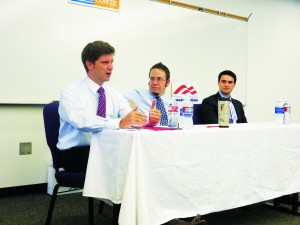
Privacy or safety. If you had to prioritize them, which would you choose?
Constitution Day, Sept. 17, is the anniversary of the ratification of the Constitution in 1789 and as of 2004, it has been used as a day to educate Americans on the Constitution.
In celebration of this day, a public forum debate on the topic of personal privacy versus national safety was sponsored by the Associated Students of Citrus College.
Debaters Ben Shapiro and Hans Johnson, referenced events from America’s past to the recent mass shooting at the Washington Navy Yard.
Ben Shapiro was hired by Creators Syndicate at age 17 to become the youngest nationally syndicated columnists in the U.S. His work has appeared in the Christian Science Monitor, Chicago Sun Times and many other publications.
Hans Johnson is president of Progressive Victory, a political consultancy in Washington D.C. He is an expert on labor, gay rights, religious extremism and has helped non-profit organizations expand their advocacy and voter-turnout rates.
Moderator Dave Milbrandt, professor of political science, began the debate by asking: “What kind of privacy rights should we have as American citizens?”
Shapiro was the first to respond.
“Government has the authority and the responsibility to protect us, but by the same token we also have a right against unreasonable search and seizure,” Shapiro said.
Johnson responded by saying the conflict regarding unreasonable search and seizure, “comes from an evolving interpretation of the Constitution and an evolving application of the Constitution.”
Shapiro retorted by saying evolution of the Constitution could only take place with legislation, not a mere interpretation.
He believed this issue is black and white and that individuals, “have to find a way to distinguish between apples and oranges, or we are going to end up with a blanket regime of surveillance or a blanket regime of no surveillance,” Shapiro said.
Tyler Hernandez, president of the ASCC, found himself forming an opinion of his own from this debate. He hopes to see more debates like this one take place at Citrus for the benefit of the students.
“When it comes to the rights of government to conduct surveillance on citizens or those who are deemed a possible threat to national security, it really comes down to who we trust in terms of that oversight,” Hernandez said.
The questions to follow continued to stir up the conversation. The common denominator amongst the left and the right side debate was brought to light by Johnson when he said, “the standard is not do we have anything to hide, the important principle at stake is do we have oversight.”
If Americans want a free society in which privacy is still protected, then society has to police itself to the extent that no matter what it is, “if you see something then say something,” Shapiro said.


